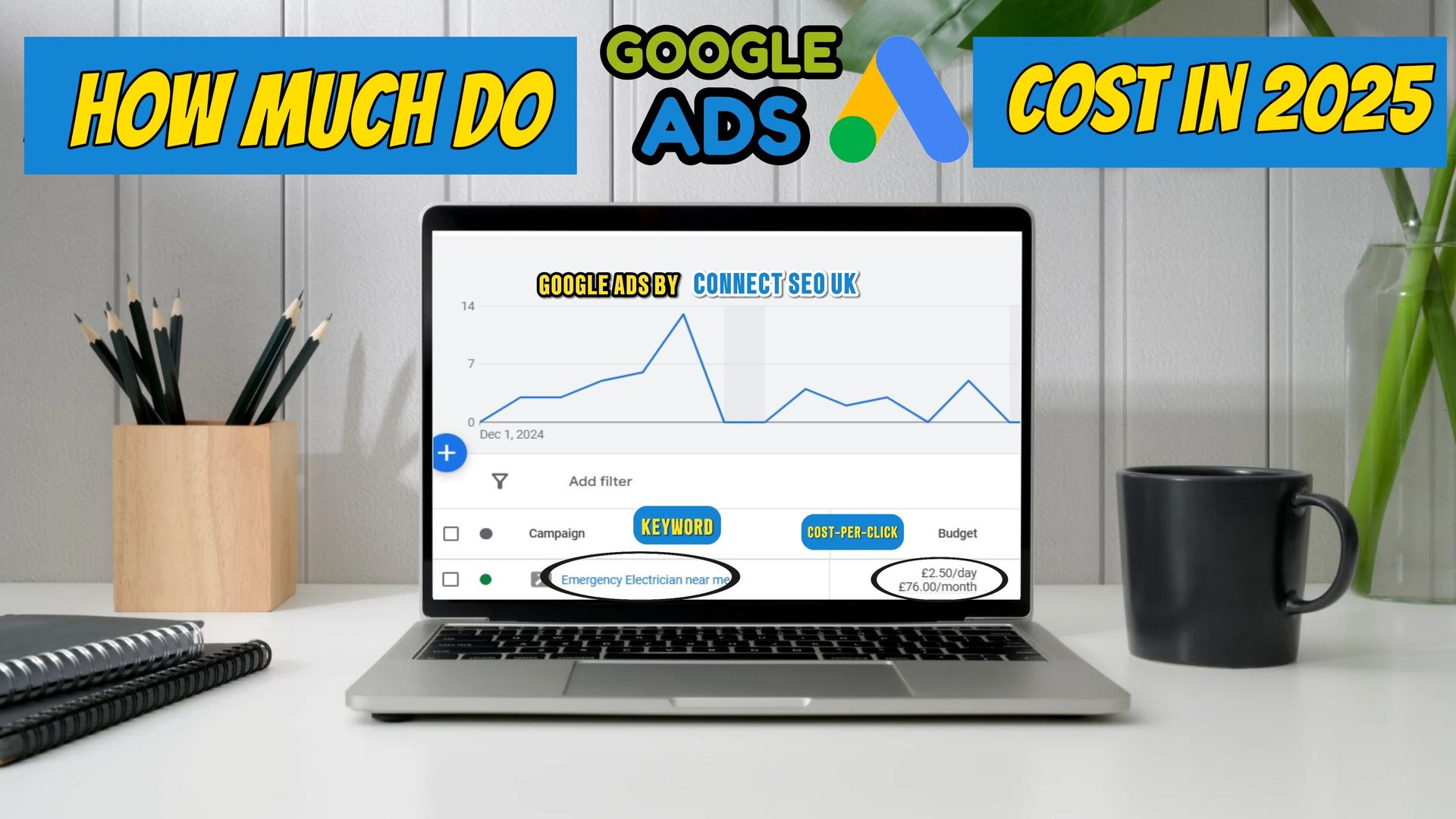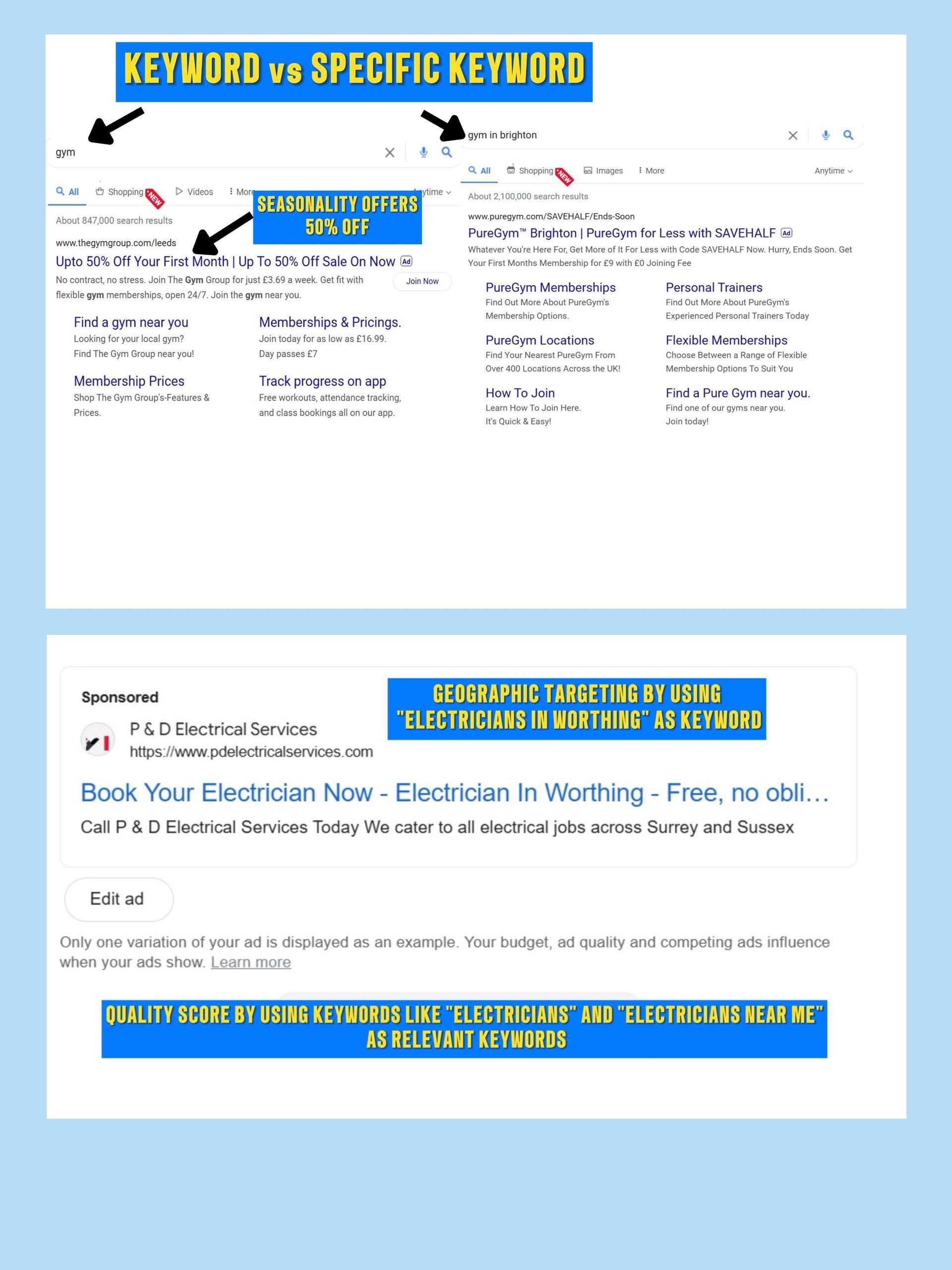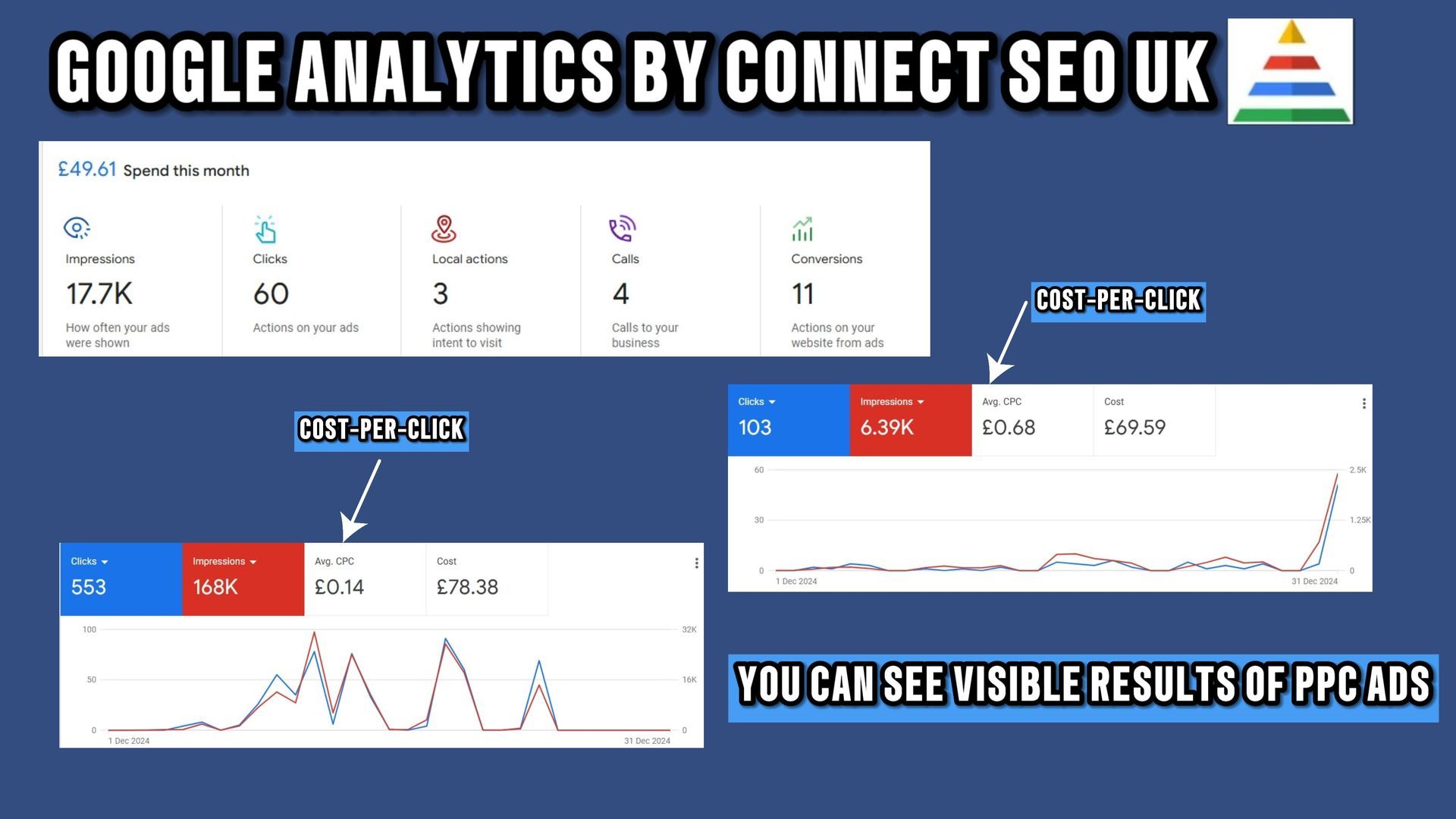How Much Do Google Ads Cost in 2025? Guide for Businesses.
How Much Do Google Ads Cost in 2025? A Complete Guide for UK Businesses
Benefits of Google Ads costs in 2025:
✅ Understanding cost factors for informed decisions
✅ Managing competition through targeted keywords
✅ Optimising Quality Score to lower costs
✅ Efficient geographic targeting for better cost control
✅ Adjusting for seasonality to make the most of peak times

GET YOUR GOOGLE ADS DONE BY OUR PROFESSIONALS TODAY!
Contact Us
Table of Contents
- Introduction
- What Factors Determine Google Ads Pricing?
- Industry Competition
- Keyword Popularity
- Quality Score
- Geographic Targeting
- Seasonality
- How Is Your CPC Determined?
- Google Ads Pricing Models
- Additional Costs to Consider
- How to Build an Effective Google Ads Budget
- Emerging Trends in Google Ads for 2025
- FAQs About Google Ads

How Is Your CPC Determined?
Now that you know what factors impact the cost of Google Ads, let’s break down exactly how your CPC is determined. It all comes down to Google’s auction system, which works like a bidding process.
Here’s what happens:
- Your Maximum Bid: This is the highest amount you’re willing to pay for a click on your ad. But don’t worry—you won’t always pay that amount. Google charges you the amount necessary to beat the next highest bid.
- Ad Rank: This score combines your bid and Quality Score. The higher your Ad Rank, the better your ad placement—and the lower your cost per click.
- Competition: If many businesses are bidding for the same keywords, the CPC will naturally rise. Google aims to create a fair auction, but when demand is high, so are prices.
- Keyword Match Type: Broad match keywords tend to attract a larger audience but may result in less qualified traffic, which could lead to wasted spend. Exact match keywords are more specific, often leading to better results for your business—but they might cost more.
- Device Targeting: CPC can vary depending on the device—desktop, tablet, or mobile. People tend to search and click differently depending on what device they’re using, so you’ll want to adjust your bids accordingly.
Google Ads Pricing Models
Now, let’s take a look at the various pricing models Google Ads offers, so you can choose the one that works best for your goals.
Pay-Per-Click (PPC)
If you want to drive traffic to your website, this is the model for you. With PPC, you pay each time someone clicks on your ad. The costs can range from £0.70 to £15+ per click, depending on your industry and the competitiveness of your keywords.
Cost Per 1,000 Impressions (CPM)
If your goal is to get your brand in front of as many people as possible, the CPM model is a good choice. With this model, you pay for every 1,000 impressions your ad gets, rather than paying per click. The costs for CPM range between £1 and £5 per 1,000 impressions in the UK.
Cost Per Acquisition (CPA)
For businesses looking to generate specific actions, such as product purchases or sign-ups, the CPA model is the way to go. With CPA, you only pay when someone takes an action that you’ve defined—like filling out a contact form or making a purchase. The costs typically range between £20 and £60 per acquisition.
Additional Costs to Consider
Along with the basic CPC or CPM costs, there are other potential expenses you should factor into your Google Ads budget.
- Professional Management Fees: If you choose to hire an agency or a Google Ads expert to manage your campaigns, expect to pay anywhere from £200 to £1,000+ per month, depending on the complexity of the campaign.
- Landing Page Optimisation: Your landing page plays a key role in your Quality Score. The better it performs (i.e., user-friendly and relevant to the ad), the lower your CPC will be.
- Tracking and Analytics Tools: To get a deeper understanding of your campaign performance, consider investing in advanced analytics tools like Google Analytics 360, which may come with additional costs.
- Ad Extensions: Adding site links, call extensions, or structured snippets can boost your ad’s performance, but they may come with slight added costs.

How to Build an Effective Google Ads Budget
Knowing how much to spend on Google Ads can be challenging. However, with the right strategies, you can effectively manage your budget and get the most out of your campaigns.
- Daily and Monthly Budgets: For example, if you're running a local bakery, a daily budget of £20 for a Google Ads campaign promoting “fresh pastries near me” might be sufficient. Larger businesses, like law firms, may allocate £2,000 or more monthly.
- Prioritising Campaigns: Focus more of your budget on high-performing campaigns. For example, if you're a retailer running a holiday sale, you may want to increase your budget during Christmas.
- Ad Scheduling: Schedule ads to show when your target audience is most likely to click. Restaurants could target lunchtime and dinner hours, for instance.
Emerging Trends in Google Ads for 2025
To stay ahead of the curve, it’s crucial to understand how the digital landscape is evolving. Here are some key trends you should watch for in 2025:
- AI-Powered Campaigns: With Google's AI and machine learning tools, ad targeting and optimisation are becoming more automated, improving the overall efficiency of campaigns.
- Privacy-First Advertising: With an increasing focus on data privacy, businesses must adjust their advertising strategies to work with first-party data and comply with regulations.
- Video Ads: Platforms like YouTube are becoming increasingly popular for video-based ads, especially with younger audiences.
FAQs About Google Ads
How do I know if my campaign is working?
You can measure success by tracking key metrics like CTR (click-through rate), conversion rate, and ROI (return on investment).
Are Google Ads suitable for small businesses?
Absolutely! Google Ads is flexible enough to suit businesses of any size, providing opportunities for small businesses to compete with larger players.
Need help budgeting your Google Ads?
Building a successful Google Ads campaign requires strategic planning and expertise. At Connect SEO UK, we specialise in creating tailored Google Ads strategies to drive traffic, leads, and conversions for your business.
Whether you’re new to Google Ads or looking to optimise an existing campaign, we can help!












